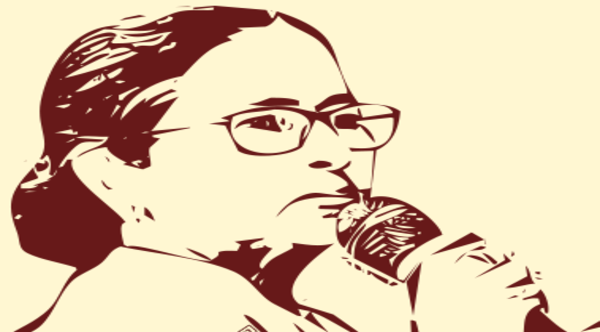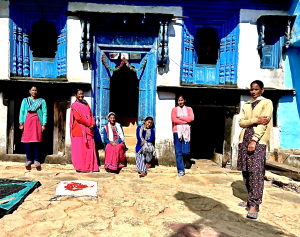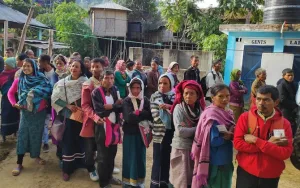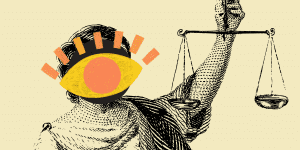From ‘Didi’ to ‘Banglar Nijer Meye’: The Rebranding of Mamata Banerjee

‘I will win Bengal on one leg and in the future, will get victory in Delhi on two legs’, thundered Mamata Banerjee, the current chief minister of West Bengal while addressing an election rally at Debanandapur village in Hooghly district during the course of her recent election campaign. Banerjee was referring to her plastered leg after a recent leg injury she sustained in an accident during campaigning. After two successive terms between 2011 and 2021, Banerjee, who is the only incumbent woman chief minister in India today and her party All-India Trinamool Congress (AITC) are facing an uphill struggle to hold on to power in the ongoing West Bengal state assembly elections being held between 27th March and 29th April, 2021.
The decade-long rule of the AITC under Mamata Banerjee has often been represented as a transitory phase in the transformation of Bengal’s political culture from a left-secular hegemony to an ascendant religious right-wing discourse. Banerjee, bearing an upper caste social location and a ‘non-gentrified’ (non-elite) cultural location, has often been seen as embodying this transition herself with her efforts to simultaneously endear herself to both the urban, educated Bhadralok (gentry) and the marginalised sections of the Bengali society.
Addressed as Didi (elder sister) by her supporters, Banerjee’s political identity reflects the popular South Asian tradition of addressing women political leaders in relational terms- Amma (mother) as the former chief minister of Tamil Nadu J Jayalalitha was called or indeed Behenji (respected sister) as Mayawati, the former and India’s only Dalit chief minister of Uttar Pradesh was referred to. Leaders such as Banerjee, while working within the constrained cultural space for women leaders in Indian politics, have defied these popular stereotypes by using these traditional gender constructs in a strategic manner.
Rise of Didi
Born in a lower middle-class, upper caste family at Kolkata in West Bengal, Mamata Banerjee’s stormy political life is characterised by high emotions. The eldest in a family of several siblings, Banerjee struggled to make ends meet after her father passed away when she was 17. In her recollections of her student life, she takes care to note how her brooding temperament and existential concerns set her apart as ‘a bit different’ from her classmates.
A popular student leader during her college days, Banerjee’s organisational and oratorical skills were instrumental in her rise through the ranks within the Indian National Congress (INC), a party she was associated with until 1998, after which she broke away and established the AITC . Her earliest and, perhaps, biggest political victory was over the veteran leader of the Communist Party of India (Marxist) (CPI(M)) leader Somnath Chatterjee in the 1984 General Elections. Her two decade long parliamentary career, involved impassioned speeches on subjects close to her heart- often at the expense of critiquing the ruling INC. Notable among them are her campaign against the misuse of the Terrorist and Disruptive Activities Prevention Act (TADA) in 1995.
Her career had an abundance of dramatic moments, both in the parliament and on the streets. In 1998, she came to a near exchange of blows with a Samajwadi Party MP due to the latter’s opposition to the Women’s Reservation Bill in the parliament. Outside of the parliament, she led a 25-day hunger strike against land acquisition for industrial purposes at Singur in 2006. Following her participation in anti-land acquisition movements at Singur and Nandigram, she won the state assembly elections in 2011- ending the 34-year long Left Front rule in West Bengal.
Among her supporters in the Trinamool Congress, Banerjee’s status as a single woman professing her total commitment to politics, a carefully cultivated austere lifestyle involving white cotton saris, rubber flip-flops, jhola (cloth tote) bags and her welfarist policies have reinforced her image as a compassionate and protective Didi to the people of Bengal. In particular, the popular Conditional Cash Transfer (CCT) schemes directed at enhancing educational opportunities for girl-students such as Kanyashree and Shobuj Sathi, have secured the support of women voters in West Bengal for the TMC in successive elections.
Even as other parties such as the Bharatiya Janata Party (BJP) are courting women voters through several promises such as 33% reservation for women in government services in the upcoming elections, Banerjee has sought to deepen her personal appeal among the women voters who constitute a critical 49% of the total electorate of West Bengal promising new initiatives such as Universal Basic Income, hostels for working women and extended patronage of women’s Self-Help Groups (SHG) in the TMC manifesto.
The TMC has also fielded 17% women candidates for the 2021 elections- 50 out of a total of 291, a significant achievement in the context of the chronic underrepresentation of women in other political parties. For the election campaign, the party has created a special front of women party members- ‘Bongo Jononi’ (Mother Bengal) specifically dedicated to mobilise women voters.
From Didi to ‘Nijer Meye’
Banerjee, throughout her political career, has been at the receiving end of negative scrutiny with a preoccupation with her appearance and personal life- a conundrum faced by women political leaders across cultures. Her Communist opponents once described her as a ‘sex worker funded by American patrons’. More recently she has been called ‘Pishi’ (father’s sister) by her detractors in the BJP as a conscious attempt to overturn her image as the benevolent Didi to Bengal’s electorate and reduce her to being an aunt to her immediate family member, her nephew Abhishek Banerjee, who is widely regarded as her political heir in the TMC. Through such tactics of linguistic subversion, Banerjee’s critics in the BJP seek to associate her with the promotion of nepotism and thereby debunk her claim of selfless political service. The state leadership of the BJP also refer to her as ‘Mumtaj Begum’- a reference to her politics accusing her of ‘Muslim appeasement’ in West Bengal.
Banerjee’s political response to such attacks in the recent times has involved a conscious reframing of her leadership style in association with the political consultancy organisation- Indian Political Action Committee (I-PAC), in an attempt to reinforce her image as a representative of the common people as well as the defender of Bengali regional identity. In recent times, she has launched public policy and administrative outreach activities such as ‘Didike Bolo’ (Tell Didi), ‘Duare Sarkar’ (Government at the Door), and ‘Paray Paray Samadhan’ (Solutions at the Neighbourhood’)- to establish and consolidate Banerjee’s image as an accessible leader in direct contact with her electorate.
Party programs such as ‘Banglar Gorbo Mamata’ (Mamata is Bengal’s Pride’), and Banerjee’s rebranding as ‘Banglar Nijer Meye’ (Bengal’s own daughter) present her an icon of nativist pride against the New Delhi-based central leaders of the BJP such as Prime Minister Narendra Modi and Home Minister Amit Shah.
Along with appeals to the women voters of the state, the image of Banerjee as Bengal’s daughter (‘Meye’) also marks a shift from the ‘street-fighter’ image associated with the persona of ‘Didi’ towards a more vulnerable figure in need of defence. The infusion of vulnerability in her self-fashioning has also received a filip in the recent months when women members of her party came out in defence of Banerjee as the Prime Minister personally taunted her with his ‘Didi O Didi’ jibe in his election rallies.
Female political leaders located in other contexts have similarly made use of traditional gender constructs and stereotypes to counter orthodox backlash to their leadership. An instance of such discursive manoeuvres is represented by Marine Le Pen- leader of the French radical right wing party, the Front Nationale (FN). While under the tutelage of her father- Jean Marie Le Pen, who is also the founder of the FN, Marine Le Pen was cast within the party as the idealised ‘political daughter’. In the subsequent struggle to consolidate her authority in the FN, Marine Le Pen chose to cast herself as a caring maternal figure as well as an adept ‘captain’- in the legacy of Joan of Arc.
Mamata Banerjee’s recent refashioning as an embodiment of Bengali regional identity and as a daughter in need of protection, therefore, represent her strategic use of the traditional gender norms and relations that are adopted by her critics to define and scrutinise her leadership. The upcoming elections in West Bengal shall determine whether Banerjee’s rebranding would be positively received by the electorate, particularly by women voters.
We believe everyone deserves equal access to accurate news. Support from our readers enables us to keep our journalism open and free for everyone, all over the world.




